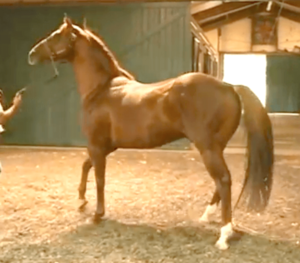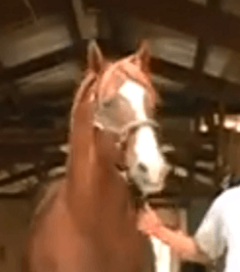Lucky Pulpit facts for kids
Quick facts for kids Lucky Pulpit |
|
|---|---|

Lucky Pulpit at Harris Farms in 2014
|
|
| Sire | Pulpit |
| Grandsire | A.P. Indy |
| Dam | Lucky Soph |
| Damsire | Cozzene |
| Sex | Stallion |
| Foaled | February 10, 2001 |
| Died | (aged 16) |
| Country | United States |
| Color | Chestnut |
| Breeder | Larry and Marianne Williams |
| Owner | Larry and Marianne Williams |
| Trainer |
|
| Record | 22: 3-5-5 |
| Earnings | $209,928 |
| Major wins | |
| Smile Stakes (2005) | |
| Awards | |
|
|
Lucky Pulpit (born February 10, 2001 – died February 13, 2017) was a famous American Thoroughbred horse. He was a stallion, meaning a male horse used for breeding. Lucky Pulpit lived at Harris Farms in Coalinga, California. He was the son of a well-known horse named Pulpit. His grandfather was A.P. Indy, who was named the best horse in the U.S. in 1992.
Lucky Pulpit had some breathing problems, which made his own racing career shorter. However, he became very famous as the father of California Chrome. California Chrome was an amazing racehorse. He won the 2014 Kentucky Derby and the 2014 Preakness Stakes. He also became the highest-earning North American horse ever. By the time Lucky Pulpit passed away in 2017, he had fathered 148 winners. These horses earned over $24 million in total.
Meet Lucky Pulpit: His Early Life
Lucky Pulpit was a chestnut colored stallion. He had a white stripe on his face called a blaze. He also had white markings on his back legs, known as socks. He was born in Kentucky and owned by Larry and Marianne Williams.
His father, Pulpit, won the Blue Grass Stakes race in 1997. Pulpit then became a very successful breeding stallion. Some of Pulpit's other famous children include Tapit and Ice Box.
Lucky Pulpit's mother was named Lucky Soph. She was born in California. As a young horse, she went to race in the United Kingdom. She won one race there when she was three years old. Lucky Soph was also related to another famous horse, Unbridled's Song. Lucky Pulpit had a half-brother named Drewman. Drewman won over $88,000 in his races.
When Lucky Pulpit was a baby horse, called a weanling, he moved to Idaho. There, he learned how to be ridden by a trainer named Dan Kiser. After his training, he was sent to California to begin his racing career.
Lucky Pulpit's Racing Days
Lucky Pulpit earned $209,928 during his racing career. He competed in 22 races. He started racing as a two-year-old in 2003. He won two races that year and finished in the top three in most of his starts.
In 2004, when he was three, he got a viral infection. This caused him to have breathing problems for the rest of his life. It made it hard for him to train before races. Often, the only time he could run fast was during the actual races. Even with this challenge, he ran seven times that year. His best finish was second place in the Santa Catalina Stakes.
Lucky Pulpit had only raced in California until 2005. Then, he traveled to tracks in the Midwest and East. He ran eight times in 2005. He won a race called the Smile Stakes at Arlington Park. After finishing second in a race at Churchill Downs in November 2005, he only raced one more time. This was in August 2006, where he finished second. After that, he retired from racing.
Lucky Pulpit: A Champion Sire
After retiring from racing, Lucky Pulpit became a breeding stallion. He fathered seven groups of foals (baby horses). By the time he passed away in 2017, he had fathered 148 winners. These horses earned a total of $24 million.
His most famous child was California Chrome. California Chrome became a superstar, winning many big races. Because of California Chrome's success, Lucky Pulpit's breeding fee went up. In 2013, it was $2,500. After California Chrome won the 2014 San Felipe Stakes, the fee increased to $10,000.
Lucky Pulpit also fathered other successful racehorses. These included Rousing Sermon, who was a champion two-year-old in California. Other winners were Luckarack, Gatheratthealter, and You're Late.
On February 13, 2017, Lucky Pulpit died at Harris Farms. He had a heart attack after breeding with his first mare of the season. At the time of his death, his breeding fee was $7,500.


